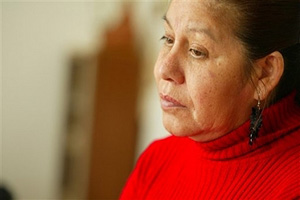 |
 |
 |
 Editorials | At Issue | July 2006 Editorials | At Issue | July 2006  
Victims Still Seek Justice in Border Deaths
 Marina Montemayor Marina Montemayor


| | Josefina Gonzalez, 52, gestures as she speaks about her dead daughter Claudia Ivette on Tuesday March 14, 2006, in Ciudad Juarez, Mexico. Mexican federal officials have quietly closed an unsuccessful, three-year investigation into the cases of 14 women who were raped and strangled in the border city of Juarez, leaving little hope authorities will ever solve a string of killings so brutal they attracted worldwide attention and inspired at least two Hollywood movies. (AP/Guillermo Arias) |
Ciudad Juarez, Mexico - Hollywood is paying attention, but that has done nothing to solve the many killings of young women in the desert outside this border city.

Feeling abandoned by Mexico's state and federal governments, the victims' families are turning to international human rights organizations for some sense of justice.

Three years after Mexico's federal government took over the probe into killings of 14 women who were raped and strangled to death — perhaps the most notorious cases among more than 100 unsolved killings of women in the area — federal prosecutors quietly gave up last month, turning the cases back over to the Chihuahua state prosecutor's office.

These same state officials long ago lost the confidence of the victims' families, who accuse local police and prosecutors of showing incompetence or lack of concern in their probes, mishandling evidence and torturing innocents to get false confessions.

"Unfortunately, laws here are never applied to help the poor," said Victoria Caraveo, a long-time activist with the nonprofit Women in Search of Justice. "These are poor women who have always been ignored and whoever commited the killings knew this."

The killings inspired at least two yet-to-be-released Hollywood movies, one starring Jennifer Lopez as a reporter trying to solve the cases.

Actresses Jane Fonda and Sally Field demanded jusice in a 2004 protest, and Fonda joined Salma Hayek in May in a Mexico City appearance to pressure the government to do more.

Murder is a state crime in Mexico, and the federal agency formed in February to investigate crimes against women nationwide said they found no evidence of a federal offense — such as organ trafficking or organized crime — that would give them jurisdiction.

The families, however, said the federal officials never bothered to keep them informed. The announcement that they were giving up the case appeared in a local newspaper — nobody bothered to tell the families first.

"State or federal, it's all the same because they never investigated," said Ana Maria Alarcon, whose 16-year-old daughter Esmeralda disappeared on her way to school in 2003. "It's as if we didn't exist because in three years, they never talked to us about their advances."

Alarcon's daughter was among the 14 cases turned over to federal prosecutors in 2003. Six victims were dumped in the desert outside Juarez; the decomposing remains of eight others were found in a trash-strewn lot in 2001.

In all, about 100 women were sexually assaulted and strangled since 1993, most of them dumped in the desert outside of Juarez, provoking outrage that reached around the world. They seemed to fit a pattern: Many of the victims were young women last seen in Juarez's downtown or after taking buses. Their bodies often did not appear until months later.

Police did arrest several people, including an Egyptian chemist who died in prison last month; a bus driver whose conviction was overturned and his co-defendant, who died in prison before sentencing. A group of gang members are serving out sentences related to some of the crimes.

Chihuahua state prosecutor Patricia Gonzalez did not immediately return a call seeking comment Wednesday. But in the past, state officials acknowledged they were overwhelmed by the murders, especially at first, and lacked the resources or training to adequately deal with the investigations.

The federal officials involved did not return phone calls either, but they have said in the past that Juarez is far from the most dangerous Mexican city for women.

That leaves the victims families with little alternative but to turn to the Washington-based Inter-American Commission on Human Rights, a branch of the Organization of American States which has agreed to investigate allegations that Chihuahua state officials planted evidence and failed to go after the real killers.

The commission reviews alleged rights violations and may recommend reparation measures, such as fines that member nations must pay to the victims. If its recommendations are not followed, the body may take cases to the Inter-American Court of Human Rights in San Jose, Costa Rica.

Many of the families now doubt the truth will ever be known. Some are focusing their anger on state investigators.

"My last hope is that at least all those officials will be punished," said Josefina Gonzalez, whose 20-year-old daughter's remains were found in 2001.

Others are preparing more appeals to the human rights commission, saying neither the state nor federal government did enough to find the killers.

"We're going to continue looking for justice," said Marisela Ortiz, a coordinator with Bring Our Daughters Home. "It's obvious all this government did was spend money opening commissions and bringing in personnel, but in the end, they did nothing."

Associated Press writer Olga R. Rodriguez contributed to this report from Monterrey, Mexico. | 
 | |
 |



